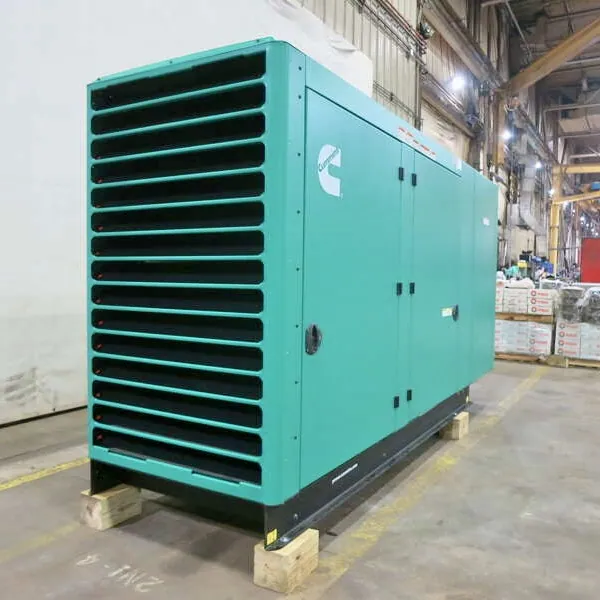TECHNOLOGY
Choosing the Right Generator for Construction Projects: Key Considerations

One of the critical decisions contractors face when embarking on construction projects is selecting the appropriate generator. The right generator can ensure seamless operation of power tools, equipment, and lighting on-site, enhancing productivity and efficiency. However, choosing a generator involves considering factors beyond simply wattage and price. We will explore essential considerations that construction professionals should evaluate when selecting a generator from Rosco Generators for their projects.
Power Requirements and Wattage Needs
Understanding the specific power requirements of your construction site is paramount before selecting a generator. Different tools and equipment have varying wattage demands, so it’s crucial to calculate the total wattage needed simultaneously or in stages. Start by listing all the equipment the generator will power, noting their starting and running wattage. This information will guide you in determining the minimum wattage capacity required from the generator to avoid overloading, which can damage both the equipment and the generator itself.
Fuel Type and Efficiency
Your generator’s choice of fuel type can significantly impact operational costs and convenience on the construction site. Common options include diesel, gasoline, propane, and natural gas. Diesel generators, for instance, are known for their fuel efficiency and longevity, making them suitable for extended use in construction environments. On the other hand, gasoline generators are more readily available and cost-effective but may require more frequent refueling. Propane and natural gas generators offer cleaner emissions and are ideal for indoor use where ventilation is a concern. Evaluate these factors, fuel availability, and storage requirements to make an informed decision.
Portability and Mobility
Construction sites often require generators to be mobile and easily transportable across varying terrain. Portability considerations include the generator’s weight and size, the presence of handles or wheels for maneuverability, and whether it can fit into confined spaces or be transported on trucks or trailers. Investing in generators with robust mobility features can streamline operations and reduce downtime associated with repositioning equipment for larger projects involving multiple sites.
Noise Levels and Environmental Impact
Construction projects frequently operate in residential or noise-sensitive areas where minimizing noise pollution is crucial. Generators with lower decibel ratings are preferred in such environments to comply with local regulations and maintain good relations with surrounding communities. Additionally, the environmental impact of generator emissions should be considered, especially in urban or ecologically sensitive areas. Opting for generators equipped with advanced mufflers or those certified for low emissions can mitigate environmental concerns while ensuring compliance with regulatory standards.
Durability and Build Quality
The rugged nature of construction sites demands generators that can withstand harsh conditions and frequent use without compromising performance. Assess the build quality of potential generators, focusing on materials used, protective features against dust and water ingress (IP ratings), and overall durability ratings from reliable sources or user reviews. Investing in generators from reputable brands known for their robust construction and reliability can minimize downtime due to equipment failure and reduce long-term maintenance costs.
Ease of Maintenance and Serviceability
Regular maintenance is essential to prolonging the lifespan and ensuring the reliability of generators on construction sites. Choose models that facilitate straightforward maintenance tasks such as oil changes, filter replacements, and spark plug inspections. Accessibility to service and repair facilities, as well as the availability of spare parts, should also be considered when selecting a generator. Opting for models with comprehensive warranty coverage and accessible customer support can further streamline maintenance efforts and provide peace of mind during extended project timelines.
Budget Constraints and Total Cost of Ownership
While the initial purchase price is a significant consideration, construction professionals should evaluate the total cost of ownership over the generator’s lifespan. This includes factoring in fuel costs, maintenance expenses, potential downtime, and resale value. Assessing the return on investment (ROI) for higher-quality generators that offer better fuel efficiency, more extended warranties, and lower maintenance requirements often justifies a higher upfront cost. Conducting a thorough cost-benefit analysis tailored to your project’s specific needs will help you make a financially prudent decision.
Adaptability to Changing Conditions
Construction projects often encounter dynamic environments where power demands and site conditions change unexpectedly. Choosing a generator with versatile features and scalability options can mitigate risks associated with fluctuating power needs. Consider generators that can parallel-connect for increased power output, adjustable voltage settings for different equipment requirements, or innovative technology integration for remote monitoring and control. This adaptability ensures that the generator can grow with your project’s needs and efficiently handle unforeseen challenges, enhancing overall project flexibility and resilience. By anticipating and planning for variability in power requirements, construction professionals can optimize resource utilization and maintain productivity under varying operational conditions.
Selecting the right generator for construction projects involves carefully evaluating power requirements, fuel efficiency, portability, noise levels, durability, maintenance needs, and cost-effectiveness. By prioritizing these considerations and aligning them with the demands of your specific construction site, you can ensure optimal performance, reliability, and efficiency from your generator throughout the project lifecycle. Taking the time to choose wisely at the outset will pay dividends in productivity, operational continuity, and project success.
TECHNOLOGY
auztron bot: Simplify Life with Advanced Automation Features

Introduction to Auztron Bot
In a world where time is money and efficiency reigns supreme, finding ways to simplify daily tasks becomes essential. Enter the Auztron Bot a revolutionary tool designed to streamline your life through advanced automation features. Whether you’re juggling work commitments, personal projects, or simply trying to find more hours in the day, this innovative bot has you covered. Imagine having a digital assistant that not only understands your needs but also anticipates them. Sounds intriguing? Let’s dive into how Auztron Bot can transform your routine and make everyday tasks feel like a breeze.
What is Automation and How Can It Benefit You?
Automation is the process of using technology to carry out tasks with little to no human involvement. It allows systems and software to execute processes automatically, streamlining workflows.
The benefits of automation are substantial. First off, it saves time. By automating repetitive tasks, you can focus on more strategic activities that require your expertise.
Moreover, automation reduces errors. Machines don’t get tired or distracted, ensuring consistency in output quality. This reliability builds trust in your results.
Additionally, automation can enhance productivity across various sectors—whether in business operations or personal life management. The efficiency gained translates into better resource allocation and improved outcomes.
In a world where every second counts, embracing automation is pivotal for anyone looking to enhance their daily routines or streamline projects.
Features and Capabilities of Auztron Bot
Auztron Bot stands out with its robust features designed to enhance daily routines. Its intuitive interface allows users of all skill levels to navigate effortlessly.
One key capability is task automation, which streamlines repetitive processes. This means you can automate everything from scheduling appointments to managing emails, freeing up valuable time.
The bot integrates seamlessly with various applications and platforms. Whether it’s connecting your calendar or syncing with project management tools, Auztron Bot ensures a smooth workflow.
Moreover, it offers advanced analytics for tracking productivity trends. Users can gain insights into their habits and make informed decisions based on real data.
Customization options are another highlight. Tailoring the bot’s functionalities to suit individual preferences enhances user experience significantly. With Auztron Bot, efficiency meets personalization in perfect harmony.
How Auztron Bot Can Simplify Your Life?
Auztron Bot is designed to streamline your daily tasks effortlessly. Imagine automating routine activities, allowing you more time for what truly matters.
From managing emails to scheduling appointments, Auztron simplifies the mundane. Its intelligent algorithms learn your preferences and adapt accordingly. No more manual data entry or repetitive chores; let the bot handle them for you.
You can easily integrate it with various platforms, making it a versatile tool in your arsenal. Whether you’re a busy professional or a parent juggling multiple responsibilities, Auztron lightens the load.
By freeing up mental space, you’ll find yourself more focused and productive. Embrace flexibility as Auztron manages notifications and reminders tailored just for you.
With this advanced automation at your fingertips, everyday life becomes less chaotic and more enjoyable. Your new assistant awaits!
Real-Life Use Case Scenarios
Imagine a busy professional juggling multiple tasks. With Auztron Bot, they automate email responses, schedule meetings seamlessly, and manage daily reminders all in one go.
Consider a small business owner who uses this tool to track inventory levels and reorder supplies automatically. This not only streamlines operations but also reduces the risk of running out of essential items.
A stay-at-home parent can benefit too. They can set up routines for household chores, like automating grocery lists based on usage patterns or scheduling cleaning tasks throughout the week.
Even freelancers find value by using Auztron Bot to send invoices automatically after project completion—saving time while ensuring timely payments.
These scenarios highlight how versatile Auztron Bot is across different lifestyles and professions!
Customer Testimonials and Reviews
Users have shared their experiences with the Auztron Bot, highlighting its transformative impact on daily tasks. Many appreciate how it seamlessly integrates into their routines, automating repetitive processes.
One customer noted that the bot saved them several hours each week. They described feeling a sense of relief and freedom to focus on more important projects.
Another user praised the intuitive interface, making it easy for anyone to get started. They mentioned that even those with minimal tech skills could harness its capabilities effectively.
Feedback also indicates exceptional reliability. Users report fewer errors compared to other automation tools they’ve tried in the past.
The supportive community surrounding Auztron Bot is another highlight for many customers. Forums and discussion groups offer solutions and tips, enhancing user experience further.
Pricing and Availability
Auztron Bot offers flexible pricing options to cater to various needs and budgets. Whether you’re a small business owner or an individual seeking personal automation, there’s a plan for everyone.
Their basic package is designed for beginners, providing essential features at an affordable rate. As your requirements grow, the premium plans unlock advanced capabilities that can significantly enhance productivity.
Availability is another strong point of Auztron Bot. It’s accessible across multiple platforms, allowing users to integrate it seamlessly into their daily routines. No matter where you are or what device you’re using, Auztron Bot ensures that automation is just a click away.
You can easily find subscription details on their official website. They also offer periodic promotions and discounts, making it easier than ever to get started with this powerful tool without breaking the bank.
Conclusion: Why Auztron Bot is a Must-Have Tool for Simplifying Your Life?
The Auztron Bot stands out as a powerful ally in the quest for simplicity and efficiency. Its advanced automation features streamline daily tasks, allowing you to focus on what truly matters. Whether managing your schedule, automating repetitive processes, or enhancing communication, this tool does it all with ease.
Users praise its user-friendly interface and smooth, effortless performance. The real-life scenarios highlight its versatility across various domains be it personal life or professional settings. With positive testimonials reinforcing its effectiveness, it’s clear that the Auztron Bot is more than just a gadget; it’s an essential resource for anyone looking to optimize their time.
With competitive pricing and availability, integrating this automation solution into your routine becomes not just feasible but advisable. Embracing technology like the Auztron Bot allows you to reclaim precious hours from mundane tasks while boosting productivity effortlessly. You owe it to yourself to experience how much simpler life can be with the right tools at your disposal.
TECHNOLOGY
Mac Računala: Exploring History, Features, and Apple Innovations

Introduction to Mac Računala (Croatian for Mac Computers)
Mac računala are now recognized worldwide for their cutting-edge technology, sleek design, and dependable performance. Since their debut, these computers have transformed the way we interact with technology. For many users around the globe, a Mac isn’t just a tool; it’s an essential part of their creative journey and everyday tasks. Whether you’re a student, professional designer, or simply someone who values quality tech, understanding what makes Mac računala stand out is crucial. Let’s dive into the fascinating history behind Apple’s iconic machines and explore why they remain popular today!
What is Mac Računala?
Mac računala, known as Mac computers, are Apple’s signature range of personal computing devices. Known for their sleek design and user-friendly interface, these devices cater to both casual users and professionals alike.
Running on macOS, Apple’s proprietary operating system, Mac računala provide a seamless experience with smooth performance. The software is tailored to maximize hardware efficiency while ensuring security and stability.
These machines come equipped with high-quality displays and powerful processors that enhance productivity. Whether you’re into graphic design, video editing, or simply browsing the web, there’s a Mac model suited for your needs.
The ecosystem surrounding Mac računala is also noteworthy. Integration with other Apple devices makes it easy to sync data across platforms effortlessly. This interconnectedness adds significant value for anyone already using iPhones or iPads.
The History of Mac Računala
Mac računala first entered the market in 1984 with the groundbreaking debut of the original Macintosh. This was a groundbreaking moment, introducing a user-friendly graphical interface that set it apart from other computers of its time.
Apple aimed to democratize technology, making it accessible for everyday users rather than just tech enthusiasts. The Macintosh quickly garnered attention for its innovative design and intuitive usability.
Throughout the years, Mac računala evolved significantly. The introduction of models like the PowerBook and iMac showcased Apple’s commitment to blending aesthetics with functionality.
In the early 2000s, Apple transitioned to Intel processors, enhancing performance while retaining their signature sleek design. Each iteration brought advancements that captivated loyal fans and new users alike.
Today’s Mac računalas are not just tools; they represent a legacy of innovation that continues to inspire creativity across various fields.
Unique Features of Mac Računala
Mac računala are known for their sleek design and intuitive user experience. One standout feature is macOS, the operating system that powers these machines. It offers seamless integration with Apple’s ecosystem, allowing users to connect effortlessly with iPhones and iPads.
Another unique aspect is the Retina display, which provides stunning visuals and vibrant colors. This makes Mac computers a favorite among creative professionals who rely on high-quality graphics.
Additionally, security features like Touch ID enhance user privacy. This biometric authentication adds an extra layer of protection without sacrificing convenience.
The build quality also deserves mention; aluminum unibody designs not only look elegant but ensure durability. Each component works harmoniously together for superior performance.
The trackpad on Mac laptops stands out due to its responsiveness and gesture support, providing an unmatched navigation experience compared to traditional mice.
Apple Innovations in Mac Computers
Apple has consistently pushed the boundaries of innovation with its Mac računala. One notable advancement is the introduction of Apple silicon, starting with the M1 chip. This new architecture improves performance and energy efficiency, redefining what users can expect from their machines.
Another significant leap was the Retina display technology. It offers stunning visuals with sharp text and vibrant colors, making it a favorite among creative professionals who rely on precise graphics.
The seamless integration between macOS and hardware sets Mac računala apart from competitors. Features like Handoff and AirDrop enhance productivity by allowing users to switch effortlessly between devices.
Moreover, Apple’s commitment to security is evident in features like Touch ID and FileVault encryption. These innovations ensure that user data remains secure without sacrificing convenience or usability.
Each iteration of Mac računala reflects Apple’s dedication to creating powerful tools tailored for both casual users and industry leaders alike.
Popular Models of Mac Računala
When it comes to popular models of mac računala, the MacBook Air stands out. Known for its sleek design and lightweight build, it’s perfect for on-the-go users. With impressive battery life and solid performance, it appeals to students and professionals alike.
The MacBook Pro takes things a step further with powerful hardware tailored for creative tasks. Its Retina display offers stunning visuals that graphic designers love. Plus, the Touch Bar enhances productivity by providing context-specific controls.
For those who prefer a desktop experience, the iMac is a favorite choice. The all-in-one design saves space without sacrificing power or functionality.
There’s the Mac mini—small but mighty. This compact computer packs a punch for home offices or entertainment setups while being highly affordable compared to other models in Apple’s lineup. Each model caters to different needs, ensuring there’s a mac računalo for everyone’s lifestyle.
How to Choose the Right Mac for You?
Choosing the right Mac računala can feel overwhelming with so many options available. Start by identifying your primary use. Are you a creative professional, student, or casual user?
For graphic design and video editing, consider a MacBook Pro for its powerful performance. If portability is key, the MacBook Air offers great battery life and lightweight design.
Next, think about screen size. A larger display can enhance productivity for multitasking while smaller screens are more portable.
Also pay attention to storage and memory capacity. Depending on your work needs, opt for models with higher specs to ensure smooth performance.
Don’t forget about budget constraints. Apple’s range includes various price points catering to different users without sacrificing quality.
Conclusion
Mac računala have transformed the computing landscape since their inception. With a blend of innovation, design, and functionality, they appeal to both casual users and professionals alike. As we explored the rich history of these computers, it’s clear that Apple has consistently pushed boundaries to enhance user experience.
From groundbreaking hardware features to seamless software integration, Mac računala stand out in a crowded market. Whether you’re drawn to the lightweight MacBook Air or the powerful Mac Pro, there’s something for everyone in Apple’s lineup.
Choosing your ideal model requires careful consideration of your needs and preferences. Each Mac offers unique strengths tailored for different tasks—be it graphic design, programming, or simple daily browsing.
As technology continues evolving at breakneck speed, one thing is certain: mac računala will remain at the forefront of innovation and creativity. Your perfect companion awaits within Apple’s offerings; all you need is to explore what fits best into your life.
TECHNOLOGY
DSLR Cameras Explained: Why They’re Still Popular in the Age of Mirrorless

Over the last few years, mirrorless technology has taken the spotlight in the photography world. New launches, lighter bodies, and cutting-edge features have made mirrorless cameras the go-to choice for many professionals and content creators for DSLR Cameras. Yet, despite this shift, the DSLR camera continues to hold its ground.
So why are DSLR cameras still popular in the age of mirrorless? The answer lies in reliability, familiarity, and real-world performance that many photographers still trust.
What Is a DSLR Camera?
A DSLR camera (Digital Single-Lens Reflex) uses a mirror mechanism that reflects light from the lens into an optical viewfinder. When you press the shutter, the mirror flips up, allowing light to hit the sensor and capture the image.
This design has been the backbone of digital photography for decades. While it may seem “old school” compared to mirrorless systems, it remains highly effective for a wide range of photography needs.
Reliability Built Over Decades
One of the biggest reasons photographers still choose DSLR cameras is reliability. These cameras have been refined over many years, resulting in solid performance, durable bodies, and predictable behavior in different shooting conditions.
For professionals who shoot events, sports, or wildlife, reliability matters more than having the newest feature. A DSLR camera is known for consistent autofocus performance, long battery life, and robust construction—especially in demanding environments.
Optical Viewfinder: A Natural Shooting Experience
Unlike mirrorless cameras that rely on electronic viewfinders, DSLR cameras use optical viewfinders. This allows photographers to see the scene directly through the lens with no digital processing or lag.
Many photographers prefer this natural viewing experience, especially when shooting fast-moving subjects. There’s no screen refresh delay, no blackout issues, and no electronic distractions—just a clear, real-time view of the scene.
Exceptional Battery Life
Battery life is another area where DSLR cameras clearly stand out. Because they don’t rely heavily on electronic screens or viewfinders, they consume far less power.
For travel photographers, wedding shooters, or anyone working long hours, being able to shoot thousands of photos on a single battery charge is a major advantage. This is one reason DSLR cameras remain popular among professionals who can’t afford interruptions.
A Massive Lens and Accessory Ecosystem
DSLR systems have been around long enough to build an enormous ecosystem of lenses and accessories. From affordable prime lenses to professional telephoto glass, photographers have countless options to choose from.
Additionally, many DSLR users already own lenses and accessories that work perfectly well. Switching to mirrorless often means investing in new gear, which isn’t always practical or necessary.
Cost-Effective and Beginner-Friendly
While mirrorless cameras tend to be priced at a premium, DSLR cameras often offer better value—especially for beginners. Entry-level DSLR models provide excellent image quality, full manual control, and interchangeable lenses at a lower cost.
For those learning photography fundamentals, a DSLR camera is an excellent teaching tool. It encourages understanding exposure, composition, and lens behavior without overwhelming users with complex menus or advanced features they may not need.
Image Quality Still Competes
A common misconception is that DSLR cameras produce inferior image quality compared to mirrorless systems. In reality, image quality depends more on sensor size, lens quality, and photographer skill than on the presence of a mirror.
Modern DSLR cameras are still capable of producing stunning photos with excellent dynamic range, sharpness, and color accuracy—on par with many mirrorless cameras.
Why DSLR Cameras Still Matter Today
Mirrorless cameras are undoubtedly the future, but that doesn’t make DSLR cameras obsolete. For many photographers, they remain practical, dependable, and enjoyable to use.
Whether it’s the tactile feel, optical viewfinder, battery endurance, or affordability, DSLR cameras continue to meet real-world needs that go beyond trends and marketing.
Final Thoughts
In the fast-moving world of digital cameras, newer doesn’t always mean better for everyone.DSLR cameras have earned their place through years of proven performance and user trust.

 BUSINESS11 months ago
BUSINESS11 months agoBrand Visibility with Imprint Now and Custom Poly Mailers

 BUSINESS12 months ago
BUSINESS12 months agoExploring the Benefits of Commercial Printing

 HOME IMPROVEMENT11 months ago
HOME IMPROVEMENT11 months agoThe Do’s and Don’ts of Renting Rubbish Bins for Your Next Renovation

 TECHNOLOGY10 months ago
TECHNOLOGY10 months agoDizipal 608: The Tech Revolution Redefined

 HEALTH7 months ago
HEALTH7 months agoThe Surprising Benefits of Weight Loss Peptides You Need to Know

 HEALTH7 months ago
HEALTH7 months agoYour Guide to Shedding Pounds in the Digital Age

 HEALTH10 months ago
HEALTH10 months agoHappy Hippo Kratom Reviews: Read Before You Buy!

 HOME IMPROVEMENT7 months ago
HOME IMPROVEMENT7 months agoGet Your Grout to Gleam With These Easy-To-Follow Tips












